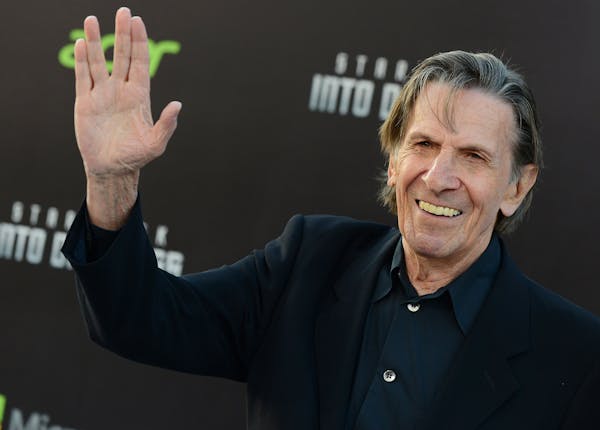LOS ANGELES — In 1975, Leonard Nimoy published an autobiography with the defiant title, "I Am Not Spock" — an attempt to show the world he had many more facets than the pointy-eared character that had come to define him.
Yet two decades later, after proving that with a career that became a rich blend of roles beyond "Star Trek" along with directing, writing and photography, he bowed to fate with "I Am Spock," a revisionist sequel.
Nimoy had come to appreciate Mr. Spock's enduring legacy and the inspiration the man of logic provided the actor and his fans alike.
"He's a part of me," he wrote in his second memoir. "Not a day passes that I don't hear that cool, rational voice commenting on some irrational aspect of the human condition."
"And if I'm not listening to Spock's voice, then I'm listening to the voices of those who know the Vulcan and consider him an old friend. ... It always amazes me and touches me to discover how deeply the series affected so many people's lives — people who chose careers in science, astronomy, space exploration, all because of one television show called Star Trek."
Nimoy had skillfully turned what could have been a caricature into a dignified, inspiringly intellectual and even touching figure, a half-human, half-Vulcan who was a multicultural and multiethnic touchstone, well before it was hip.
Nimoy died Friday of end-stage chronic obstructive pulmonary disease at his Los Angeles home, with family at his side, said his son, Adam Nimoy. He was 83. His final public statement, last Sunday on Twitter, was thoughtful and bittersweet.
"A life is like a garden. Perfect moments can be had, but not preserved, except in memory," he wrote, followed by his customary "LLAP" signoff — shorthand for "Live long and prosper," Spock's catch phrase.
The reaction to his death was swift, on Earth and in space.
"I loved him like a brother. We will all miss his humor, his talent, and his capacity to love," said William Shatner, whose often-emotional Captain Kirk was balanced by the composed Nimoy.
President Barack Obama said, "I loved Spock."
"Long before being nerdy was cool, there was Leonard Nimoy," Obama said in a statement. "Cool, logical, big-eared and level-headed, the center of Star Trek's optimistic, inclusive vision of humanity's future."
"Live Long and Prosper, Mr. (hashtag) Spock!" tweeted Italian astronaut Samantha Cristoforetti, aboard the International Space Station.
George Takei, Mr. Sulu of "Star Trek," called Nimoy a great man and friend.
"We return you now to the stars, Leonard. You taught us to 'Live Long and Prosper,' and you indeed did, friend," Takei said.
In a 2009 interview with The Associated Press, Nimoy recalled how an early stage role left him "obsessed" with pursuing work that had a social impact.
"I've fulfilled that dream, including 'Star Trek,' for that matter," he said. "If that's part of the legacy, then I'm very pleased with that. I would hope the work I chose to do had some reason for being done other than just simply being a job."
After "Star Trek" ended, the actor immediately joined the hit adventure series "Mission Impossible" as Paris, the mission team's master of disguises. He also hosted the syndicated TV series "In Search of ... ," which attempted to probe such mysteries as the legend of the Loch Ness Monster.
Other notable roles included Israeli leader Golda Meir's husband opposite Ingrid Bergman in the TV drama "A Woman Called Golda; he continued to work well into his twilight years, playing wealthy genius William Bell in the Fox series "Fringe."
He also directed several films, including the hit comedy "Three Men and a Baby," and appeared in plays and published books of poems, children's stories and his own photographs.
But that work was always eclipsed by the role of the green-blooded space traveler that took him overnight from bit-part actor to TV star.
"Star Trek," created by Gene Roddenberry and set in the 23rd century, had an unimpressive debut on NBC on Sept. 8, 1966, and it struggled during its three seasons to find an audience beyond youngsters and teenagers, according to "The Complete Directory to Prime Time Network and Cable Shows" by Tim Brooks and Earle Marsh.
A recently published history of the show, the three-volume "These Are the Voyages" by Marc Kushman, paints a different, far more positive picture of the show's ratings and its audience.
The space adventure seemed headed for oblivion after it was canceled in 1969, but its dedicated legion of fans, who called themselves Trekkies, kept its memory alive with conventions and clubs and constant demands that the cast be reassembled for a movie or another TV show.
Trekkies were particularly fond of Spock, often greeting one another with the Vulcan salute and "Live long" motto that Nimoy was credited with bringing to the character. He pointed out, however, that the hand gesture was actually derived from one used by rabbis during Hebraic benedictions.
People identified with Spock because they "recognize in themselves this wish that they could be logical and avoid the pain of anger and confrontation," Nimoy concluded in a 1995 interview.
Embracing the role he'd once shunned, he even lampooned himself on such TV shows as "Futurama," "Duckman" and "The Simpsons," and in commercials.
When the cast was reassembled for "Star Trek — The Motion Picture," in 1979, the film was a huge hit, and five sequels followed. Nimoy appeared in all of them and directed two. He also guest-starred as an older version of himself in some episodes of the spinoff TV series, "Star Trek: The Next Generation."
In 2009, he was back in a new big-screen version of "Star Trek," this time playing an older Spock who meets his younger self, played by Zachary Quinto. Upon the movie's debut, Nimoy told the AP that in his late 70s he was probably closer than ever to being as comfortable with himself as the logical Spock.
"I know where I'm going, and I know where I've been," he said. He reprised the role in the 2013 sequel "Star Trek Into Darkness."
Born in Boston to Jewish immigrants from Izyaslav, in what is now Ukraine, Nimoy was raised in an Italian section of the city where he said he felt the sting of anti-Semitism growing up.
At age 17, he was cast in a local production of Clifford Odets' "Awake and Sing" as the son in a Jewish family.
"This role, the young man surrounded by a hostile and repressive environment, so touched a responsive chord that I decided to make a career of acting," he said later.
He won a drama scholarship to Boston College but eventually dropped out, moved to California and took acting lessons at the Pasadena Playhouse.
Soon he lost his "Boston dead-end" accent, hired an agent and began getting small TV and film roles.
After service in the Army, Nimoy returned to Hollywood, working as taxi driver, vacuum cleaner salesman, movie theater usher and other jobs while looking for acting work.
In 1954, he married Sandra Zober, whom he met at a Los Angeles theater in the Hollywood area, and they had two children, Julie and Adam. They divorced, and in 1988 he married Susan Bay, a film production executive.
Last year, Nimoy used Twitter to announce he had pulmonary disease. He linked it to smoking, a habit he said he quit 30 years before. In January, he tweeted: "Don't smoke. I did. Wish I never had."
Besides his wife, son and daughter, Nimoy is survived by his stepson, Aaron Bay Schuck. Services will be private, Adam Nimoy said.

Drone footage shows Ukrainian village battered to ruins as residents flee Russian advance
In heated western Minn. GOP congressional primary, outsiders challenging incumbent

Minnesota Sports Hall of Fame: A class-by-class list of all members

